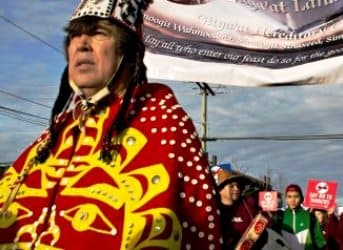Canada’s aboriginal “First Nations” have unexpectedly emerged as a potential force threatening to derail the plans of Canadian Conservative Prime Minister Stephen Harper’s plans to turn western Canada into an energy powerhouse underwriting eastern Asia’s various demands for energy.
Who are these obstructionists?
The First Nations are the various Canadian aboriginal peoples who are neither Inuit nor Métis, with Ottawa currently recognizing over 630 First Nations governments or bands spread across Canada, roughly half of which are in the provinces of Ontario and British Columbia.
For decades Canada has belatedly dealt with issues as Pacific coastal natives sought treaties to spell out their relationship with the rest of the country. Accordingly, successive Canadian courts have ruled that in the absence of settled claims, the First Nations actually have rights and title to all aspects of traditional lands.
Related article: Is a final Decision on Keystone XL Close at Hand?
Not surprisingly the First Nations are somewhat skeptical of Ottawa’s blandishments about the benefits accruing from developing the nation’s hydrocarbon resources.
Imperiled projects? They include TransCanada Corp.’s Energy East’s proposed 3,000-mile pipeline in across First Nation lands, which would traverse the traditional territory of 180 different aboriginal communities, each of whom must be consulted and have their concerns accommodated as part of the company’s effort at winning project approval.
The First Nations have major potential abilities to disrupt such initiatives. According to a new report by the Fraser Institute, there are more than 600 major resource projects worth a total of $650 billion planned for western Canada imperiled by Ottawa’s relations with the First Nations.
The report notes, “There is not a single oil or gas project under proposal in Western Canada that does not affect at least one First Nations community, and the willingness of these communities to participate in energy development can be the factor that determines the success of a project.”
The pressures are largely economic - according to the Fraser Institute’s Ravina Bains, “If you look at the actual geographic location of where these communities are located, in many cases there aren’t any other economic development opportunities around them.”
Bains added that the “obstacles” included education, as currently fewer than half of First Nations’ youth successfully complete high school, compared to approximately 80 percent of non-native youth.
Related article: Labour Shortages Threaten Canada’s $50 Billion LNG Investment Plans
So, how to move forward?
Negotiate.
Canadian Prime Minister Stephen Harper appointed Vancouver lawyer and treaty negotiator Doug Eyford to try and resolves outstanding issues. Some of the First Nations leaders who have met with Eyford during his nine-month fact-finding assignment say that his findings could perhaps shift discussions to innovative and dramatic discussions between the First Nations and the Canadian government over several multibillion-dollar energy developments that have been proposed for British Columbia. First Nations Summit executive council Dave Porter noted of Eyford, “The first thing I’d say is that they chose a person I think has the skill set to do the job. I’ve been impressed with [Mr.] Eyford’s ability to listen. … He’s done a tremendous job of being open and ready to engage with whomever wanted to talk with him about this issue. If he’s listened, what he will say [to the Prime Minister] is there needs to be full engagement of the aboriginal leadership of British Columbia in a process that involves joint planning, joint decision making about energy maters in B.C., be it policy, legislation or projects. I mean we are talking beyond consultation [which] has evolved to a process where governments decide to do something and then tell us about it. What needs to be done is people have to start to talk together… and building relationships.”
If the talks fail, there’s always the media. Lining up superstar firepower, Canadian music legend Neil Young has scheduled four concerts in Canada for the northern Alberta aboriginal band Athabasca Chipewyan First Nation to benefit organizations battling oilsands development, scheduled for January in Toronto, Winnipeg, Regina and Calgary, with 100 per cent of ticket sales from the shows to fund the band's protest.
With $600 billion in potential energy deals at stake, Ottawa ought to sharpen their listening capabilities very carefully.
By. John C.K. Daly of Oilprice.com


















IMO, such agreements should have a time limit on them (a renewal clause) as well. This would allow a reassessment of development, say 10 years into a project, to ensure that the terms of the agreements are being met.
Perhaps some may want to be seen as constructionist, rather than obstructionists.